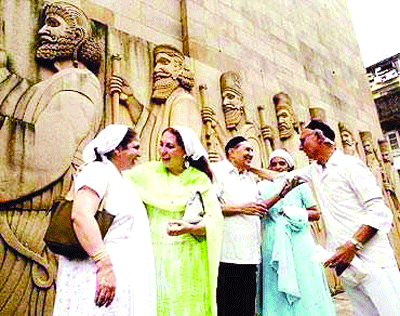As the population ratio of the Parsi community in India declines, REANSHI VIKRAM explores the reasons for it and the steps that have been taken to control the same
The Parsis first came to Northern India when it was under the reign of Emperor Akbar. Impressing His Majesty with their knowledge and modesty, they were invited by Akbar to his Capital at Fatehpur Sikri. The word Parsi originated from Persia, which literally means Persian, the official language of Iran. During the 8th and 10th centuries, most of the Parsis migrated to Gujarat and Sindh because of Muslim intruders trying to conquer Iran.
Parsis are the descendants of Zoroastrian culture, whose founder was Zoroaster or Zarathushtra. However, in contemporary India, Parsis are said to be shrinking in number, to the extent that, reportedly, they would soon be considered a tribe rather than a community.
Talking about their culture, Parsi food is delightfully rich in variety and taste. For enjoying its luscious and scrummy taste, you can go to the popular Delhi Parsi Anjuman (DPA), formed in 1925. The food there would activate your drooling mode automatically, in fact, they cook special food for non-Parsis on Thursdays and Sundays, as the owner of the place, Mrs Bagli mentions.
The core of Zoroastrian religion is the holy fire temple; in the Capital, its brick was laid down in 1961 and is located at Delhi Gate. It is also an intermediate place for all communal and festival celebrations for the Parsis. Another interesting fact about the Parsis is that their surnames are usually derived from their family professions. For instance, a family of treasurers will have the surname Treasurywala.
Parsis are an integral part of our society but still less in number, and in coming years they might completely vanish from our land. The reasons for this are their lower birth rate than death rate, lower fertility rate in females, migration, and all these interconnected with their choice of priorities. Parsis are said to have a firm mindset that prefers careers to families. They rightly seek to have a prosperous and opulent life and during that course they ignore mingling with other people socially. For them being educated and rich becomes more important than having a child and a family.
“Having a glimpse of the Parsi community, we perceived that they are so hard working and so obsessed with their dignity that they neglect their social and biological life, as they want to become so rich that they can be self-satisfied and can have a fancy lifestyle. This is the only reason why Parsi women marry late, maybe even at the age of 35-40. At this age their fertility rate goes down and they face problems in conceiving. And even if Parsis plan to have children, they prefer a single child as they don’t want any obligation in their professional front and this entire cycle leads to the dwindling population of the Parsis”, says Dr Shernaz Cama, Director of Parzor Foundation.
Apparently, even the elderly Parsis like to work till late at night, even at home, neglecting their health. So, Parsis are not necessarily introverted but are actually a hard working lot who consider their jobs as their priority.
Mostly settled in Mumbai, in ancient times their ancestors build the Parsi Bagh there for them to live together in an integrated area. “living together did not help them any way to get married in a Parsi family though. Even though the parents drill their children with the suggestion of marrying late so that they can preserve their life with wealth and materialistic things, sometimes Parsi women choose to marry non-Parsis as they think that the non-Parsis are richer and more successful and have higher standards of living. At the same time, marrying a non-Parsi tends to lead to the decrease in population as the child would officially be considered of non-Parsi origins,” says Ava Khullar, executive council of Parzor Foundation.
Nevertheless, the Parsi community is an indispensable part of our society, and we need to emphasise on their diminishing population so that they can secure their presence. Focusing on this, the Government has launched many schemes. Bombay Panchayat and UNESCO have also initiated the Parzor Project for saving the Parsi Community. Jiyo Parsi, on the other hand, is a Governmental scheme launched in 2013-2014 by the Ministry of Minority Affairs. It calls for the enhancement of the Parsis as a community and for this the Government would provide financial help, medical assistance and also focus on advocacy/outreach programmes to generate awareness among the Parsi population for lineage inflation. It has been divided in two parts —Advocacy and Medical Assistance for Reproduction. Advocacy aims to work upon family planning and asking people to choose partners and have children at the right age and time. The other section looks after the health of women and provides financial help for infertility treatments and counselling to Parsi couples after their fertility problems are medically detected.
In the 12th Five Year Plan, the Government has invested Rs10 crore for these schemes. Jiyo Parsi and other schemes are working hard also to provide knowledge about the Indian and Zoroastrian cultures for their enlightenment through books, articles, counselling classes and giving a wide view of their demographic figures.
In the past 10 years, approximately 680 Parsi couples have sought assistance and 230 children were born till date. Hence, it is helping and developing a lot and we hope for a good future of the Parsis. Some of the famous Indian Parsis are Ratan Tata, Homi Bhaba, Homai Vyarawalla, Boman Irani, Cyrus Mistry, Ness Wadia, Ronnie Screwvalla, and so on. In fact, Farooq Sheikh, John Abraham, and Farhan Akhtar too have Parsi mothers. Reportedly, Delhi has 750 Parsis.

























